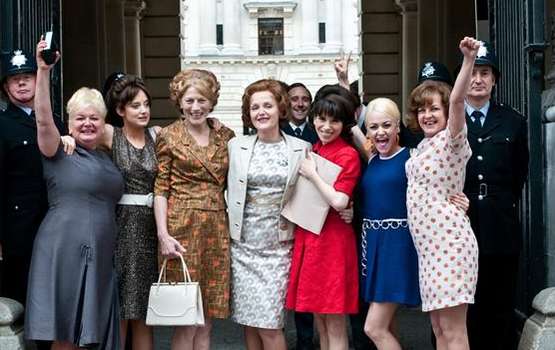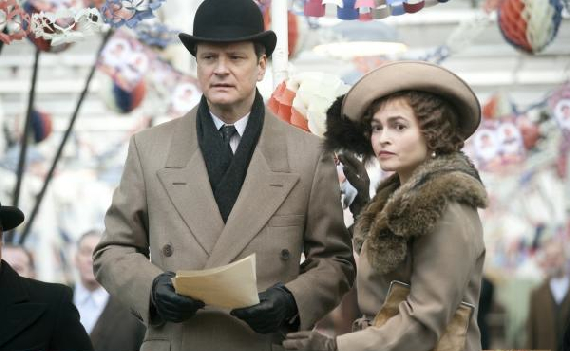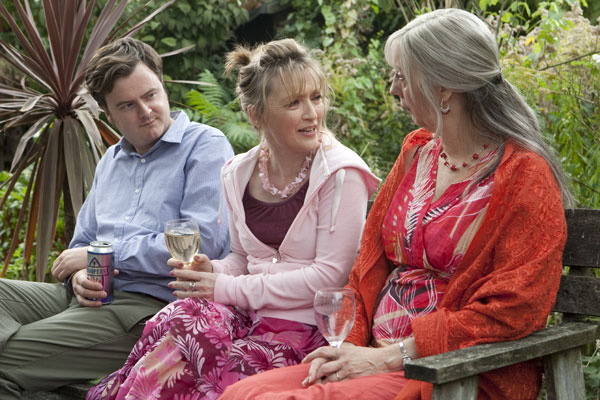Thu 25 Nov 2010
The British Are Coming! The British Are Coming!
Posted by Ethan under Film Review, NYC Film Critic
Comments Off on The British Are Coming! The British Are Coming!
Made in Dagenham
Directed by Nigel Cole
Screenplay by William Ivory
Starring Sally Hawkins, Bob Hoskins, Rosamund Pike
**1/2
The King’s Speech
Directed by Tom Hooper
Screenplay by David Seidler
Starring Colin Firth, Geoffrey Rush, Helena Bonham Carter
***
Another Year
Written and Directed by Mike Leigh
Starring Jim Broadbent, Ruth Sheen, Lesley Manville
****
Every fall, our friends across the pond send over several of their cinematic wares in the hopes that one or more of them find a berth in Hollywood’s annual Oscar race. This year’s crop of British prestige pictures includes a pair of period pieces—Nigel Cole’s Made in Dagenham and Tom Hooper’s The King’s Speech—as well as the latest film from a revered veteran, Mike Leigh’s Another Year. (Two other hopefuls—Steven Frears’ Tamara Drewe and Mark Romonek’s Never Let Me Go—were released earlier in the awards season but failed to gain any traction.)
Set in the titular London suburb in the late ‘60s, Made in Dagenham is, at heart, a British version of the ‘80s chestnut Norma Rae, which starred Sally Field as a blue-collar factory worker that spearheads a campaign to organize a union at her textile plant. To be fair, Dagenham is based on actual history—furious over not being listened to by management, the 187 women that worked in Dagenham’s Ford Motor Company outpost walked off the factory floor in 1968 and refused to return to work until their demands—including equal pay for women—had been met. In translating this incident to the screen though, the filmmakers treat history more like Hollywood fiction, beginning with the film’s main character Rita O’Grady (played by Sally Hawkins) who is a composite creation based on several of the real strikers. Outgoing and fiercely loyal to her family at home as well as her family at the plant, Rita becomes the leader of the Dagenham walkout, a position that wins her cheers from her co-workers and boos from the male-dominated union, which doesn’t want the women’s strike upsetting their relationship with Ford. Hawkins anchors the film quite well and, behind the camera, Cole puts the material through its paces effectively enough, but overall Made in Dagenham feels as factory-assembled as one of the Ford cars glimpsed in the movie. There’s no spark of ingenuity or inventiveness to the proceedings—it’s all been carefully calculated, right down to the serio-comic tone the Brits love to layer on top of their contemporary histories. It’s telling that the most interesting part of the movie is the closing credits, where some of the real women that participated in the Dagenham strike share their memories for the camera. Perhaps those interviews should have constituted the entire film…
The title of The King’s Speech has two meanings. First, it refers to the terrible stammer that plagued the British monarch Albert Frederick Arthur George (who ruled under the name George VI) from his childhood to the time he assumed the throne in 1936, following the abdication of his elder brother Edward VIII. The second meaning doesn’t reveal itself until the film’s climax, when George (who is played by Colin Firth) addresses his nation by radio on the eve of World War II. In the movie’s version of history, that speech almost single-handedly gave the country the strength to take on Hitler thanks to George’s steady, impassioned (and stutter-free) delivery. The reason he was able to make it through his address without stammering was due to the aid of his longtime speech therapist Lionel Logue (Geoffrey Rush), an Australian immigrant living in London and entertaining dreams of being an actor in between dispensing elocution lessons. Logue and George were first introduced to each other in 1925 through the latter’s wife, Elizabeth a.k.a. the Queen Mum (Helena Bonham Carter). While Logue’s unconventional methods upset his royal patient at first, George noticeably improved under his care. More importantly, the two men became friends and remained so up until their deaths. The King’s Speech has been crafted to serve as an actors’ showcase first and foremost and Firth and Rush don’t disappoint. (For that matter, neither does Carter, though her role is more limited.) Both men deliver strong performances that enhance screenwriter David Seidler’s rather routine dramatization. Trying to avoid the “made-for-the-BBC†feel that plagues a lot of British prestige pictures, Hooper does some interesting things with the staging as well; in Lionel and George’s first encounter in Logue’s basement office, for example, he shoots them well outside the center of the frame, drawing our attention to the dingy environment the future king finds himself in. Still, for all its charms, I have to admit to finding The King’s Speech somewhat plodding and pat. Much like Stephen Frears’ The Queen, another entry in the “British monarchs are people too!†canon, the movie is a little too enamored of its royal characters. It makes a point of exposing their foibles only to end up re-affirming their power and importance. (The movie’s closest thing to a villain is Wallis Simpson, the American divorcee that won Edward’s heart and led him to give up the throne.) The King’s Speech is in many ways the art-house version of a crowd-pleasing summer blockbuster—it keeps you entertained while you’re in the theater, but doesn’t linger long on the ride home.
Mike Leigh’s films generally demand several viewings in order to fully appreciate their nuance and subtlety. Movies like Happy-Go-Lucky and Topsy-Turvy, which are already quite good the first time around, become revelations the second, third and fourth time you see them. This is another way of saying that I’m eagerly anticipating another viewing of Leigh’s newest work, Another Year. Divided into four chapters—each set during one of the four seasons—the movie chronicles a year in the lives of elderly married couple Tom and Gerri (Jim Broadbent and Ruth Sheen). While they are the central characters, the real star of the film is Mary (Lesley Manville, in a tour-de-force performance), their perpetually drunk and boisterous friend who attempts to cover up the sadness of her life with alcohol and lengthy visits to her pals’ lovely suburban house. At first, Mary comes across as a walking freakshow, to the point where you wonder why Tom and Gerri even associate with her. Indeed, that’s something I wrestled with for awhile after my first viewing–do they genuinely like her? Do they view her as someone they can help? Or do they like having her around because she makes them feel that much better about themselves? (The third explanation particularly troubled me, as it means that Tom and Gerri are, deep down, even more awful than Mary. Fortunately, I’ve more or less settled on the second option as the most likely. But that’s the wonderful thing about Leigh’s movies–he never tells you what to think, instead expecting you to make up your own mind.) As the movie progresses, Manville masterfully reveals new layers and facets to her character’s personality. In a way, she represents the kind of person Poppy from Happy-Go-Lucky might grow up to become if life deals her one too many disappointments. (To bust out a Sandman reference, Poppy is Delight while Mary is Delirium. Neil Gaiman fans will know what I mean.) Each chapter of the film is filled with terrific scenes, but for me the fourth and final one is the most fully realized, beginning with a funeral and ending around the dinner table as the characters look ahead to another year, some with hope and others with sad resignation. It’s the kind of honest, bittersweet conclusion that Leigh excels at and a memorable capper to a film that’s not easy to shake.
Made in Dagenham opened in limited release on November 19 and The King’s Speech opens in select theaters on Friday. Both will expand to more cities over the next month. Another Year opens in limited release on December 31.




No Responses to “ The British Are Coming! The British Are Coming! ”
Sorry, comments for this entry are closed at this time.